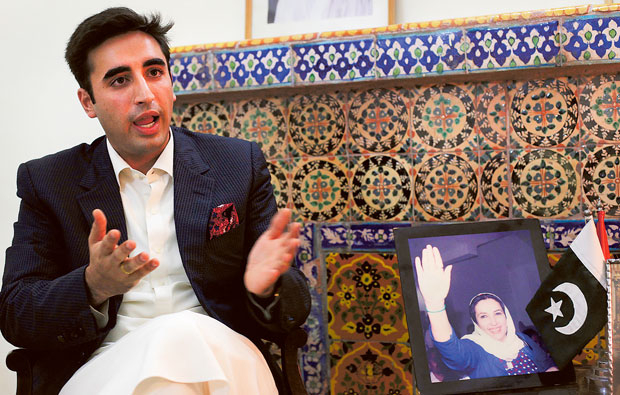
Naudero: The scion of Pakistan’s leading political dynasty, emerging from the shadow of his mother and former prime minister Benazir Bhutto seven years after she was assassinated, has vowed to resurrect her party’s flagging fortunes.
In the first interview since his political “coming out” at a weekend gathering of hundreds of thousands of supporters, Oxford-educated Bilawal Bhutto Zardari told Reuters that he planned a series of rallies in a challenge to Pakistan’s embattled prime minister, Nawaz Sharif.
“Like any politician, like the head of any political party we are looking to expand our vote bank, make gains, gain more seats,” the 26-year-old said in his hometown of Naudero in southern Pakistan late on Wednesday.
“And therefore I will be looking to do that in every way possible,” said Bhutto, wearing a blue blazer over a traditional white shawal kameez shirt and trousers.
His Pakistan People’s Party (PPP) ruled the country from 2008 to 2013, but it became tarnished by a series of confrontations with the powerful Supreme Court over corruption scandals.
After people became disillusioned with its image and policies, it was voted out in a landmark election last year that was the first time in Pakistan’s short but turbulent history that one elected civilian government replaced another.
The emergence of Bhutto as an opposition leader comes at an opportune time for the PPP and is likely to be a worry for Sharif.
The incumbent’s authority has been shaken by weeks of antigovernment protests led by former cricket star Imran Khan and Tahir ul-Qadri, a firebrand cleric.
Convincing people he is a force to be reckoned with, however, will be an uphill task for Bhutto, whose youth may prevent him from being taken seriously beyond the PPP’s stronghold in the southern province of Sindh.
“These political orphans and puppets would want us to be a dictatorship again,” he said, referring to Khan and Qadri and their protests.
“But Pakistan is over that. We are a democracy. We have had a civilian transfer of power.”
Bhutto, whose age did not allow him to contest the 2008 elections, said he would rely on Pakistan’s young population for support and make fighting poverty his central agenda.
“Sixty per cent of the population of Pakistan is young ... and of course I, being 26, I think can relate to them more than any other Pakistani political leader can,” he said.
“For me, serving the people ... is about poverty alleviation.”
The Bhuttos have often portrayed themselves as champions of the poor in a country where feudal landlords own vast tracts of land and agricultural workers often live in deep poverty.
As well as his youth, Bhutto can draw on a name more evocative than any other in Pakistan.
His family’s story is as torrid as the country’s; his mother Benazir was assassinated at an election campaign rally in 2007, and his grandfather was hanged by a military dictator in 1979.
Benazir’s killer has never been caught, and a U.N. inquiry found that Pakistani authorities had failed to protect her or properly investigate her death.
Benazir remains a powerful symbol and people often refer to her as a martyr. The capital’s airport and a scheme to give cash to poor families have been named after her.
While the young Bhutto’s remarks about the poor are consistent with the PPP’s traditional position, he is far more hawkish than his party has been on the issue of Pakistan’s long-standing rivalry with India.
The PPP’s five years in power were marked by a warming in ties between the nuclear-armed neighbours.
The two countries came close to signing a bilateral trade deal that was called off by the generals after Sharif came to power, underlining the military’s long tradition of dictating policy to civilian leaders from behind the scenes.
“The United Nations Security Council, the people of Pakistan, Pakistan as a country and the people of Kashmir all agree on what the way forward is; it’s only India that keeps making excuses and sabotaging peace,” Bhutto said.
“My generation, our generation on both sides of the border won’t put up with this,” he added, in surprisingly strong comments.
Bhutto has been an outspoken critic of the hardline Islamist Taliban movement, which threatened his party with attack during the run-up to the 2008 election.
After his mother was killed, her widower, Asif Ali Zardari, returned from self-imposed exile to successfully contest the election. He remains co-chair of the PPP along with his son.
Bhutto said the PPP was ultimately responsible for a major military operation against the Taliban launched in the lawless tribal areas in July, and said Sharif, who was in favour of peace talks with the militants, had been reluctant to give the go-ahead.
“It only happened because of the political pressure mounted by the Pakistan People’s Party and our fierce, vocal and brave opposition,” Bhutto said.
“The Nawaz Sharif government was reluctant and the peace process was a consensus built among the right-wing parties that dominate discourse in Pakistan. We took it upon ourselves to go against this policy of appeasement.” Sharif originally pursued negotiations with the Taliban to end the bloodshed, angering the Pakistani military in the process, but ongoing violence scuppered the talks.












